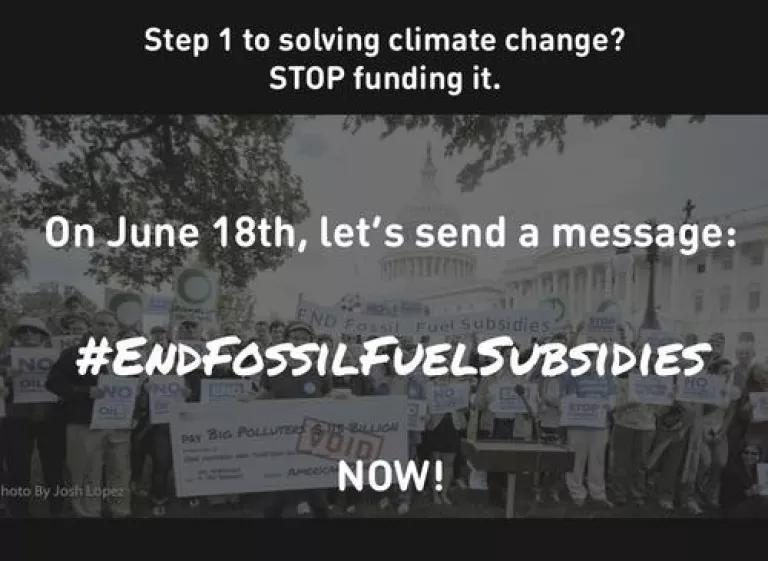Ending fossil fuels subsidies at Rio+20 would be an environmental and economic win for the world

This year, governments around the world are expected to pour nearly a trillion dollars in subsidies into one of the most profitable industries on the planet – the fossil fuel industry. NRDC and Oil Change International recently released an issue brief which lays out the benefits that come from eliminating subsidies for fossil fuels. Phasing out fossil fuel subsidies offers national governments an opportunity to address three pressing issues of our time – the urgent threat of climate change, global economic malaise and constrained government budgets.
As a matter of policy, phasing out fossil fuel subsidies is a no brainer. Few policies exist that allow international leaders to reduce emissions by the equivalent of about half a billion cars, increase public revenues by nearly a trillion dollars while fostering economic growth. But the international community has been going in the wrong direction - fossil fuel subsidies have nearly tripled since 2009 when G-20 countries first pledged to eliminate them.
That is why it is so important that leaders use the Earth Summit at Rio+20 to change course and agree to fulfill their pledges by 2015. It’s time to get their attention. Over the next twenty-four hours, join NRDC, 350.org, Avaaz.org, and other leading groups in telling world leaders that it is time to #endfossilfuelsubsidies.
Here is what these subsidies are and why their continued existence is disaster for both the global environment and international economy:
What are fossil fuel subsidies?
There are two basic types of fossil fuel subsidies – production and consumption subsidies. Production subsidies, which are common in developed countries, offer companies that produce fossil fuels money, tax breaks or other benefits, diverting funds from the public to already highly profitable companies in an entrenched industry.
While production subsidies add to the profits of the fossil fuel industry, they have little effect on supply or prices. For example, a recent study of oil production subsidies found that production was determined by geology and prevailing crude oil prices, not subsidies. The authors concluded that “the main outcome of drilling and production tax deductions and incentives is to reduce and delay tax revenue collections.”
Fossil fuel consumption subsidies, which are common in developing countries, generally involve government spending to artificially lower or cap the public price of fossil fuels. These subsidies are expensive to maintain, divert public funds away from beneficial social services and incentivize wasteful uses for fossil fuels.
While a major justification for maintaining consumption subsidies is to protect the poor, in practice these subsidies represent a costly and inefficient safety net for vulnerable populations. Wealthy households tend to use more fuel and are more likely to own vehicles than poor households. An IEA survey of eleven developing nations comprising about half of the world’s population found that between 2% and 11% of fossil fuel consumption subsidies benefit the poorest populations. Simply stated, fossil fuel subsidies are the wrong tool to help the poor.
Benefits of eliminating fossil fuel subsidies
No matter how the numbers are calculated, eliminating global fossil fuel subsidies represent a tremendous opportunity to reduce global reliance on fossil fuels, decrease greenhouse gas emissions, foster economic growth and generate a significant public savings.
Eliminating international fossil fuel subsidies would be a major step in the global fight against climate change. IEA estimates that eliminating fossil fuel subsidies by 2020 would reduce annual global energy demand by nearly 5 percent and carbon dioxide emissions by nearly 6 percent, or 2.6 gigatons. To put that in perspective, that’s the equivalent annual emissions of nearly half a billion cars.
The economic benefits of phasing out fossil fuel subsidies are tremendous as well. Removing these subsidies would make hundreds of billions of dollars available for beneficial public endeavors and increase economic growth. The Global Subsidies Initiative reviewed six respected modeling and empirical studies of fossil fuel subsidy reform and found that eliminating fossil fuel subsidies would increase gross domestic product (GDP) throughout the world.
And it’s easy to see why. After all, phasing out fossil fuels puts renewable energy on a more level playing field, giving these new, clean technologies a chance by reducing the cost differential. And clean energy investments create four times as many jobs as investments in the petroleum industry according to a study by the University of Massachusetts. The first step to create a clean energy economy for the future is to stop subsidizing the dirty energy sources of the past.
How to eliminate fossil fuel subsidies
In May 2012, a coalition of over seventy-five NGOs representing millions of citizens worldwide called on world leaders to 1) define concrete plans to phase out fossil fuel subsidies by 2015; 2) increase the transparency in reporting fossil fuel subsidies and 3) incorporate safeguards to protect the poor and vulnerable, ensuring that all people can get the energy they need. The roadmap is clear – it’s time to break through the international gridlock on this issue and see concrete action at Rio+20.
Over 1 million citizens throughout the world have already called on their leaders to phase out fossil fuel subsides. We need your help to send a clear signal to world leaders at Rio+20 that it is time to end fossil fuel subsidies. Over the next 24 hours, NRDC, 350.org, Avaaz, and many other organizations will be storming the airways with the message on twitter and facebook: #endfossilfuelsubsidies.

Go to endfossilfuelsubsides.org to learn more about this issue and how you can add your voice to the citizens demanding action at the G20 and Rio on fossil fuel subsidies.

